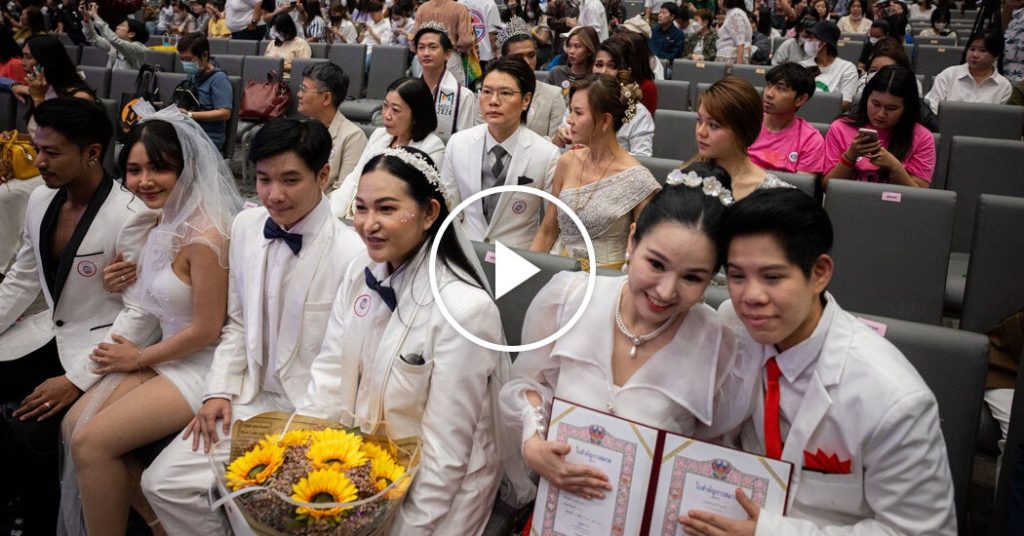It’s a historic day in Thailand. Picture this: a joyous sea of couples, hand in hand, beaming with love and excitement, standing together in solidarity. That was the scene in Bangkok as hundreds of same-sex couples tied the knot in a grand mass wedding ceremony. The atmosphere was electric, filled with hope and immense pride, as Thailand made headlines for becoming the first country in Southeast Asia to legalize same-sex marriage. It’s a monumental leap for LGBTQ+ rights in a region known for its mix of conservative values and sporadic progressive breakthroughs.
For so many of these couples, this day wasn’t just about legal recognition — it was about being seen, valued, and fully accepted in their own homeland. Amidst the revelry, a newlywed couple expressed their joy, saying, “It means the world to us and to Thai people because we’ve been waiting for this moment for so long. Now we can express our love in public and we are accepted in society, in hospitals, by the government — everywhere.” Their words were a powerful echo of what this moment symbolizes: inclusion, validation, and progress.
While marriage is often seen globally as a romantic milestone, for the LGBTQ+ community, it has always been so much more. Think of the small yet significant things taken for granted in heterosexual marriages — hospital visitation rights, inheritance laws, or simply being able to present themselves as a legally recognized couple. For same-sex partners in Thailand, these legal barriers and societal stigmas have loomed large for decades. Now, with this legislation, the journey from exclusion to inclusion has taken a groundbreaking step forward.
Another couple, brimming with emotion, shared, “I’m more than happy because we’ve never, never dreamed that this day would finally happen in Thailand.” Their words put into perspective the decades of yearning, advocacy, and resilience that paved the way to this moment. For years, LGBTQ+ activists and allies in Thailand have fought tirelessly to challenge discriminatory laws and cultural norms. Their perseverance ensured this milestone wasn’t just a fleeting aspiration but a firm legal victory enshrined in Thai law.
As progressive as this move is, it’s essential to recognize Thailand’s unique position in the broader Southeast Asian context. While often celebrated internationally as a haven for LGBTQ+ individuals — thanks to its vibrant Pride parades and cultural acceptance of gender diversity — Thailand has long been constrained by legal inequalities. Same-sex couples have historically lived under the shadow of a legal system that didn’t fully extend the same rights and protections afforded to heterosexual couples. This legalization marks a turning point but also leaves room to ask: what’s next for broader LGBTQ+ rights in the region?
To put this into a broader context, Thailand’s progress stands in sharp contrast to its neighboring countries. Across Southeast Asia, the LGBTQ+ fight often clashes with deeply entrenched societal norms, religious beliefs, and conservative political structures. In nations like Malaysia, Indonesia, and Brunei, same-sex relationships are not only stigmatized but criminalized. The stark differences within the region amplify Thailand’s legal victory, making it a beacon of hope for activists and communities fighting for recognition and equality elsewhere.
This victory, however, did not materialize overnight. It’s the culmination of years — if not decades — of efforts by legal experts, activists, and everyday citizens pushing for change. From grassroots campaigns to lobbying members of government, the fight for marriage equality in Thailand has been a collaborative patchwork of perseverance. While undeniably celebratory, it’s also a moment of reflection and acknowledgment of all the sacrifice and dedication that led to this day.
What’s heartening is the ripple effect this development could potentially create. Major societal shifts often begin with a single step, and Thailand is now leading by example. Could this legislative stride inspire other countries in the region to reconsider their stance on same-sex rights? It feels possible. Visibility, as we’ve seen time and again, is power. And Thailand’s bold step toward inclusion sends a powerful message to its neighbors — progress is possible, and love must never be legislated based on prejudice.
Even as Thailand celebrates this milestone, the road ahead for global LGBTQ+ rights remains long and winding. This moment is a reminder of what’s possible when advocacy meets perseverance, but it’s also a call to action for others around the world. After all, true equality transcends borders. It isn’t just about celebrating love in Thailand; it’s about envisioning a global community where love, in all its forms, is acknowledged and cherished without fear or discrimination.
So here we are, witnessing history unfold through the radiance of love and the unshakable determination of those who never gave up hope. Watching these happy couples exchange vows and celebrate their unions is far more than a touching spectacle. It’s a statement, a victory cry, a promise that love will always outshine prejudice.
For Thailand, this is a defining moment — one that affirms its position as a trailblazer in Southeast Asia for LGBTQ+ rights. For the couples now united in marriage, it’s a day they’ll treasure forever, marking the start of a life unfettered by former restrictions. And for the rest of the world, it’s a powerful reminder: progress may be slow, but it is always worth fighting for.


